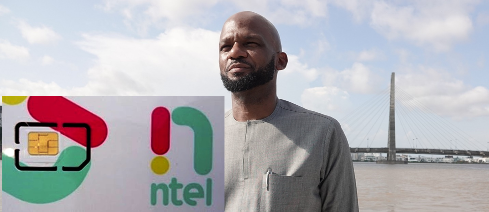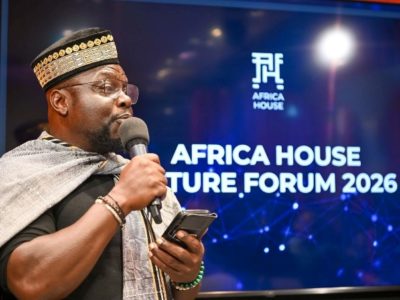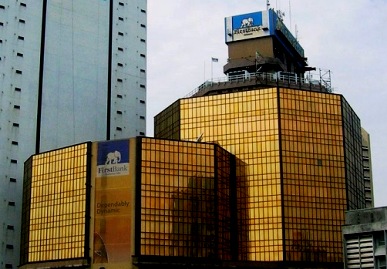ntel Announces 2026 Comeback with Focus on Innovation and Inclusion
Soji Maurice-Diya, Chief Executive Officer of NatCom Development & Investment Limited (ntel), says the company is poised for a major market comeback in Q1 2026 with a bold strategy designed to close innovation gaps in Nigeria’s telecom industry.
RELATED: AMCON secures fresh funding to relaunch ntel by 2026 under new turnaround strategy
Speaking at the Technology Times Thought Leadership Series, a quarterly platform powered by Digital Transformation Media Limited (DTML), publishers of Technology Times and eGovernance Nigeria Magazine, Maurice-Diya unveiled ntel’s “infrastructure-light” model centered on innovation, broadband inclusion, and youth-focused digital engagement.
“We think that there’s a lot of innovation that’s yet to happen in this space,” he said. “With all due respect to our partners and competitors in the ecosystem, there hasn’t been nearly enough innovation in recent years.”
According to him, ntel’s comeback strategy won’t compete head-on for market share with large operators but will instead target niche segments through differentiated digital services.
“We’re not playing in the 100 million-subscriber game,” he explained. “We’re focused on a smaller subset of customers and serving them exceptionally well.”
Reimagining the Role of Telecoms in a Digital Nigeria
Maurice-Diya noted that while Nigeria’s telecom industry has matured over the past 25 years, the next growth phase must focus on innovation and cross-sector value creation.
“The telecoms sector has been a key enabler of Nigeria’s economy,” he said. “But going forward, telcos must evolve beyond connectivity to become digital platforms that unlock new opportunities across various industries.”
He commended established operators like MTN, Airtel, and Glo for their long-term commitment and contributions to GDP growth, while emphasizing that ntel’s re-entry will bring fresh ideas and partnerships to expand digital inclusion.
Policy Synergy: Strengthening Communications and Finance
Maurice-Diya praised the Federal Ministry of Communications, Innovation and Digital Economy for recent policy reforms, including tariff relief measures implemented between late 2024 and early 2025. He said these reforms have restored investor confidence and created justification for renewed investment.
He called for stronger synergy between the communications and financial sectors, describing it as critical to building a sustainable digital economy.
“We need closer collaboration between both ecosystems to define the next 25 years of growth,” he said.
The ntel CEO also advocated for dynamic pricing, tax incentives, and sustainability-driven infrastructure policies to improve competitiveness and encourage long-term investment.
Driving Connectivity and Supporting National Broadband Goals
Maurice-Diya commended the Federal Government’s rural broadband drive, particularly plans to deploy 7,000 telecom towers and 90,000 kilometres of fibre optic infrastructure in the next five years.
“These are welcome interventions that will deepen connectivity,” he said. “ntel will play its part by supporting the ecosystem and developing innovative products to expand access.”
He reaffirmed ntel’s commitment to contributing to Nigeria’s national broadband and inclusion targets, aligning with government initiatives to ensure affordable internet access for all Nigerians.
Balancing Regulation and Innovation
Maurice-Diya called for regulatory flexibility that prioritizes innovation before restrictive oversight.
“Regulation should follow innovation, not the other way around,” he said. “When you over-regulate, you stifle progress.”
Citing global examples like cryptocurrency regulation, he urged Nigeria’s regulators to allow experimentation while maintaining oversight to ensure safety and market stability.
Local Content: Building Sustainability from Within
The ntel boss highlighted the need for local content development in telecoms infrastructure, talent, and technology.
“The sustainability of the industry depends on how much we can localize,” he said.
He lauded initiatives such as the 3 Million Technical Talent (3MTT) programme for building indigenous capacity, while urging more policies that support local technology production and innovation.
“External dependence can be expensive,” he warned. “Long-term sustainability requires local solutions and commitment.”
Ensuring Long-Term Investment Confidence
Maurice-Diya noted that maintaining macroeconomic stability—especially around foreign exchange, tax policy, and capital repatriation—will be vital to attracting sustained investment in the telecoms sector.
“Investors want assurance that their capital is safe and retrievable,” he said. “The government should tie tax incentives to long-term investment commitments to build confidence.”
He recommended aligning incentives across sectors like finance, education, and logistics to strengthen Nigeria’s digital ecosystem.
ntel’s Digital-First Comeback Strategy
Reflecting on ntel’s legacy as the successor to Nigeria’s first national operator, NITEL, Maurice-Diya said the company’s return will be anchored on a digital-first, innovation-led model designed for scalability and youth engagement.
“Our comeback is built on a light digital play,” he said. “We aim to innovate and serve Nigeria’s youthful population through meaningful, tech-driven experiences.”
With over 3 to 4 million Nigerians turning 18 every year, ntel plans to tap into this growing demographic by offering affordable, youth-oriented digital services.
Redefining Legacy Through Innovation
Asked about his long-term vision for ntel, Maurice-Diya said the company’s goal is to create services that deliver real impact, blending profitability with social and economic value.
“In 10, 15, or 20 years, we want to be remembered for offering services that stood out and made a difference,” he said.
He emphasized that ntel will continue to leverage its legacy infrastructure while fostering partnerships across the telecom ecosystem to ensure industry sustainability.
Creating a Fair and Competitive Telecoms Market
Maurice-Diya concluded by stressing the importance of a level playing field that encourages both incumbents and new entrants to compete fairly.
“The market is big enough for multiple players,” he said. “What matters is a fair, transparent ecosystem that rewards innovation and efficiency.”
He called for continued market liberalisation and pro-innovation regulation, which he believes are essential to maintaining Nigeria’s global competitiveness in the next decade.






























